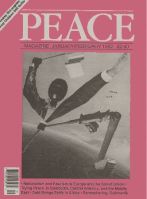
Peace Magazine Jan-Feb 1992, page 12. Some rights reserved.
Search for other articles by Colleen O'Manique here
African countries find little to celebrate in the New World Order. The end of the Cold War has made them marginal to international diplomacy and they have become insignificant in the global economy-except as debtors-because of declining commodity prices. The risk of military conflict has been heightened by the economic stresses.
The recent Oxfam report "War and Famine in Africa" states that "Conflict, impoverishment, and drought have pushed many countries toward food insecurity and political disintegration."
There are both positive and negative developments throughout the continent. Here is a glance at some trouble spots.
The violence of apartheid continues, in the form of low intensity warfare throughout the southern African region. In South Africa's borders, there was startling revelation of the government's direct support for Buthelezi's Inkatha Movement. Inkatha continues to pit blacks against blacks, fragmenting the opposition to apartheid.
However, we can be cautiously optimistic about change in South Africa; the question is not if Apartheid will be dismantled, but when.
A year-long civil war came to an end last September, along with the tyrannical rule of Samuel
Doe. Murdered by rebel leader Charles Taylor, Doe has been replaced by interim leader Dr. Amos Sawyer. Unfortunately recent events suggest that Sawyer will, instead of loosening the shackles of Doe's rule, tighten his grip on the people.
Sawyer has been ineffective in reconciling Charles Taylor and Prince Johnson, leaders of the two ethnic factions of the rebel movement, who are both guilty of genocidal atrocities against the civilian population. He has failed to bring reconciliation between the two ethnic factions. The failure of Liberia's recent All-party Conference to reach agreement with Taylor's National Patriotic Front of Liberia, which controls 90% of the country by force, has dashed any hope of an early resolution to the crisis.
Hundreds of thousands of Liberians remain trapped inside and outside the country-displaced and destitute.
The two-year-old civil conflict in Somalia ended in January of 1991, with the overthrow of Somalia's octogenarian ruler, Major General Mohamed Siad Barre. Barre's legacy of divide-and-rule, clan-based politics will be hard to overcome. The appointment of interim president Ahmahdi Mohammed by the United Somali Congress was opposed by the two other important rebel groups: the northern-based Somali National Movement, and the southern-based Somali Patriotic Movement. It is still unclear whether Somalis can remain united now that their common enemy, Barre, is gone. The potential exists for Somalia to turn into another Liberia, a battle-field of rival rebel groups.
This past June and July, Mengistu's military forces, heavily armed and numbering more than 350,000, crumbled, fled, and surrendered before the three main rebel forces in a remarkably orderly and bloodless takeover. Since Mengistu's downfall, ethnic political groupings are able to operate openly and fifteen such parties are actively participating in the attempt to form a new governmental system. The Oromo people have set aside their long-expressed aim of setting up an independent state of Oromia.
At the July 1st conference, representatives of more than twenty-five groups and international observers met in the capital. Eighty-one seats were distributed among the twenty-seven parties, six seats being reserved for other groups that might join in the future. The conference approved the intention of the new Provisional Eritrean Government to hold a U.N.-supervised referendum on independence from Ethiopia in two years. In the meantime, Eritrea will have a separate government, maintaining its border and remaining aloof from Ethiopia's internal affairs.
Angola's sixteen-year-old civil war finally ended with the signing of the May 31, 1991 peace accords between President Jose Eduardo dos Santos and U.S. and South African-backed UNITA leader Jonas Savimbi. Estimated war damages up to 1988 stand at $20 billion; the cost of the most basic repairs and reconstruction an estimated $2 billion.
To obtain any foreign credit, the MPLA government first has to implement the requisite structural adjustment package. The feeling among the leadership is that unpopular economic measures will jeopardize the fragile peace and irreparably damage its chances of winning the first multiparty elections in 1992. In the meantime, hopes are resting on the return of the estimated two million or more Angolans who have fled the war. It is hoped that they will produce food to supplant present imports. But first, over one million mines have to be cleared from the fields.
Predicting when an effective ceasefire will be reached to end Mozambique's civil war, which has cost the lives of over 600,000 people and driven a million others to seek refuge in neighboring countries, is impossible. The peace talks between the South-African backed RENAMO and the Mozambique government delegation in Rome-which began over a year ago-have been plagued with delays. Initial violations, blamed on RENAMO, raise the question of how much control the rebel leader, Alfonso Dhalkama, exerts over an estimated 20,000 strong force. Attacks by RENAMO continue.
While peace is critical, it will require the reconstruction of one of the world's poorest nations. One-quarter of Mozambique's 15 million people
remain dependent upon food aid for their survival, 60% live in absolute poverty.
Brian Mulroney's recent policy of tying Canadian aid to respect for human rights has been largely applauded in the West. Ironically, by supporting the devastating economic policies of structural adjustment, Canada causes even more insecurity and instability. Structural adjustment creates condition that deprive the majority of African people of their basic human rights. In this regard, Canada is hardly an innocent bystander to continued instability in Africa.
Colleen O'Manique is a graduate student in Political Science at York University.

Peace Magazine Jan-Feb 1992, page 12. Some rights reserved.
Search for other articles by Colleen O'Manique here